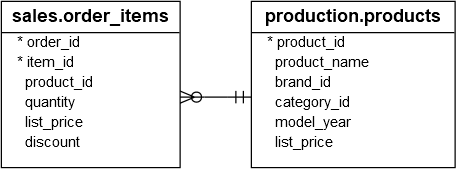Summary: in this tutorial, you will learn how to use the SQL Server EXCEPT operator to subtract a result set of a query from another result set of another query.
Introduction to SQL Server EXCEPT operator
The SQL Server EXCEPT compares the result sets of two queries and returns the distinct rows from the first query that are not output by the second query. In other words, the EXCEPT subtracts the result set of a query from another.
The following shows the syntax of the SQL Server EXCEPT:
query_1
EXCEPT
query_2
Code language: SQL (Structured Query Language) (sql)The following are the rules for combining the result sets of two queries in the above syntax:
- The number and order of columns must be the same in both queries.
- The data types of the corresponding columns must be the same or compatible.
The following picture shows the EXCEPT operation of the two result sets T1 and T2:

In this illustration:
- T1 result set includes 1, 2, and 3.
- T2 result set includes 2, 3, and 4.
The except of the T1 and T2 returns 1 which is the distinct row from the T1 result set that does not appear in the T2 result set.
SQL Server EXCEPT operator example
See the following products and order_items tables from the sample database:

A) Simple EXCEPT example
The following example uses the EXCEPT operator to find the products that have no sales:
SELECT
product_id
FROM
production.products
EXCEPT
SELECT
product_id
FROM
sales.order_items;
Code language: SQL (Structured Query Language) (sql)
In this example, the first query returns all the products. The second query returns the products that have sales. Therefore, the result set includes only the products that have no sales.
B) EXCEPT with ORDER BY example
To sort the result set created by the EXCEPT operator, you add the ORDER BY clause in the last query. For example, the following example finds the products that had no sales and sorts the products by their id in ascending order:
SELECT
product_id
FROM
production.products
EXCEPT
SELECT
product_id
FROM
sales.order_items
ORDER BY
product_id;Code language: SQL (Structured Query Language) (sql)
In this tutorial, you have learned how to use the SQL Server EXCEPT to combine result sets of two queries.